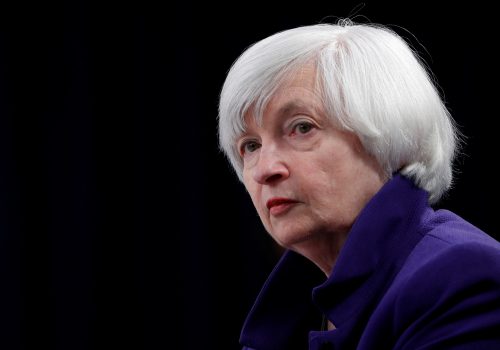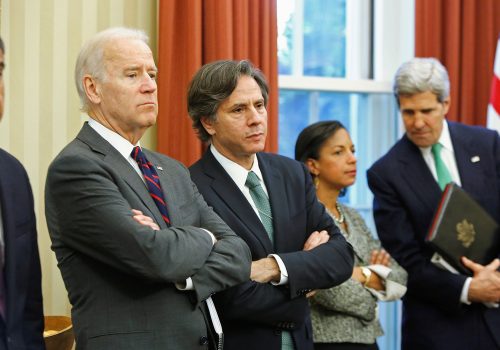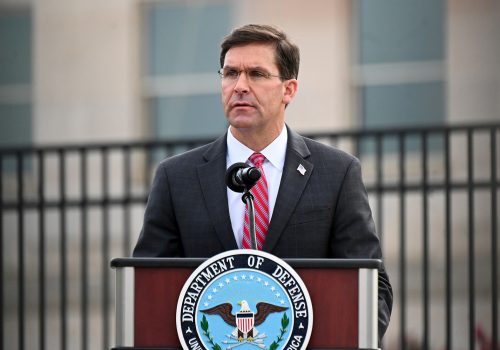FAST THINKING: Meet the picks for Biden’s national security team
JUST IN
Tony Blinken for secretary of state (get up to speed with our previous edition). Avril Haines for director of national intelligence (she’d be the first woman in the role). Alejandro Mayorkas for Homeland Security secretary (he’d be the agency’s first Latino leader). Not to mention Linda Thomas-Greenfield for ambassador to the United Nations and Jake Sullivan for national security advisor. Joe Biden’s selections for his incoming national security team are coming in fast. But what’s the bigger picture that’s coming into focus?
TODAY’S EXPERT REACTION COURTESY OF
- Julia Friedlander (@jfriedlanderdc): Former director at the National Security Council and deputy director of the GeoEconomics Center
- James Cunningham (@JBCunningham_): Former US ambassador to the UN and nonresident senior fellow
- Bronwyn Bruton (@BronwynBruton): Director of programs and studies in the Africa Center
- Tom Warrick (@TomWarrickAC): Former Department of Homeland Security official and nonresident senior fellow
- Mat Burrows (@matburrows): Former counselor to the National Intelligence Council and director of the Foresight, Strategy, and Risks Initiative in the Scowcroft Center for Strategy and Security
- Emma Ashford (@EmmaMAshford): Grand strategist and Atlantic Council resident senior fellow in the Scowcroft Center’s New American Engagement Initiative
National Security Advisor: Jake Sullivan
- Sullivan, who will be 44 when he takes office, will be the youngest person in the role since McGeorge Bundy during the Kennedy administration. But he’s a veteran of the Obama administration who will be a trusted aide at Biden’s side. That’s important, because the White House was in constant turmoil under Donald Trump, who cycled through four national security advisors (plus two acting ones). As Julia notes, the chaos spread throughout the National Security Council. Sullivan “will have the task of reasserting a strong, deliberative interagency process,” she tells us.
- Julia was a director on Trump’s NSC. “Under pressure from backdoor decision-making, distrust of the civil service, and internal rivalries, the Trump administration saw this process effectively break down,” she says. “Agencies learned to work around the NSC, not through it.”
- “This will change,” Julia thinks, with Sullivan in the post. She expects him to make “meaningful but not fundamental structural changes to the organization.” But more important than that, she adds, is “getting the right people in the door.”
UN Ambassador: Linda Thomas-Greenfield
- Biden will reportedly restore this post to cabinet status, potentially giving Thomas-Greenfield an NSC seat. (The post requires Senate confirmation.) James thinks she’ll be able to accomplish a lot: “Returning the American UN ambassador to cabinet rank means that the one person in the US foreign-policy instrument who literally has daily contact with influential representatives from the world over will have the authority of the president, and his senior leadership, behind her when she speaks.”
- Trump had minimized America’s role at the United Nations. “There is no avoiding the fact that America’s influence has deteriorated over the past four years, and there is much damage to be repaired,” James says. “Today’s announcement tells the world that President-elect Biden is set on restoring a sense of purpose, seriousness, and professionalism not just to the chambers of the United Nations, but to America’s engagement with the world.”
- Thomas-Greenfield was assistant secretary of state for African affairs in the Obama administration and before that held diplomatic posts around the world, including US ambassador to Liberia. Bronwyn tells us she’s known “for her quiet competence, her gravitas as a stateswoman, and her tremendous capacity for building bridges and understanding.” She adds that she expects Thomas-Greenfield to “begin her tenure with a listening tour of our allies, a first step in what will be a long effort to restore the United States’ reputation for professionalism and integrity in our foreign dealings.”
- And her deep experience in Africa could help Biden manage the aftermath of Trump’s moves to de-emphasize US commitments there, Bronwyn notes. “It will probably be difficult for Biden to reverse those actions in the early years of his presidency,” she says. The new ambassador “will be forced to explain the logic and limitations of US engagement in Africa at what promises to be a difficult time. She will be invaluable in that regard.”
DHS Secretary: Alejandro Mayorkas
- Tom is pleased with the pick of Mayorkas, a former US attorney who was deputy secretary of the Department of Homeland Security in the Obama administration after serving as director of US Citizenship and Immigration Services. He calls him “an excellent choice who bridges the worlds of immigration policy, national security, and law enforcement that are central to the breadth of DHS’s responsibilities.” He notes that Mayorkas, who was born in Cuba, also “brings the perspective of immigrants who came to the United States for freedom and liberty.”
- Mayorkas has a reputation as a quick study, Tom adds, which would help him understand and manage a bureaucracy with sprawling responsibilities: “immigration, cyber, border, and maritime security, as well as counterterrorism, emergency management, continuity of government, and being the largest law enforcement department in the federal government. There is a reason the Secretary of Homeland Security is sometimes called the second-toughest job in Washington.”
- Just as importantly, Tom notes, “Mayorkas is an extraordinarily effective public communicator. His personal story, his professional experience, and his management abilities running large organizations are all going to be put to use restoring DHS’s credibility with Democratic constituencies that, until recently, were calling for ‘Abolish ICE’ or ‘Abolish DHS.’”
Director of National Intelligence: Avril Haines
- If confirmed, Haines, who was deputy director of the CIA and then deputy national security advisor under Obama, would inherit a position that has been badly scarred by the politics of the Trump era. “Her biggest challenge will be to restore the integrity of the DNI’s role, which under Trump was widely seen outside and inside the US intelligence community as being politicized by the previous holder, John Ratcliffe,” Mat explains.
- Done well, Mat says, the DNI role can serve as an important conduit between the intelligence community and the president. The office of the DNI prepares the President’s Daily Brief, and the director often attends the briefing sessions with the commander-in-chief. Haines can help to “boost the intelligence community’s workforce morale,” he says, if she uses this access to establish a reputation for “speaking truth to power.” Her experience with the CIA will help, Mat notes, “but she will have her work cut out for her.”
So what does all of this say about the president-elect?
- Emma notes the air of restoration that has surrounded Biden’s picks. The team so far, she says, “is predominantly composed of appointees who hope to restore American foreign policy to the way it was before Donald Trump’s presidency, with the possible exception of Jake Sullivan, who has argued in the past that “Trump’s approach is dangerous, but he has surfaced questions that need clear answers.”
- “Restoring American foreign policy, however, is both problematic and easier said than done,” Emma says. “The world has changed over the last four years.” Not least among these changes, she adds, is “an increasing perception that US foreign policy has become partisan.”
- At the same time, as Emma sees it, “restoration of the pre-Trump consensus is also deeply problematic. America’s post-Cold War liberal international consensus had become unwieldy, over-militarized, and too focused on coercing other states. Thus, while there are many reasons to welcome Biden’s announcement of qualified, competent foreign-policy hands to key roles, the fact that they mostly seek to restore US foreign policy to this largely unsustainable status quo is problematic.”
Further reading
Mon, Nov 23, 2020
FAST THINKING: It’s Yellen for Treasury
Fast Thinking By
Janet Yellen could face an economy devastated by the coronavirus and the haphazard response to it in Washington. Josh Lipsky provides insight into how she might manage a difficult recovery.
Mon, Nov 23, 2020
FAST THINKING: How Tony Blinken sees America
Fast Thinking By
Joe Biden is reportedly about to make his first major foreign-policy move by announcing that he’ll nominate Tony Blinken, his longtime advisor and a veteran of the Clinton and Obama administrations, as secretary of state. To answer the big questions about who Blinken is and how he might serve in the role, we turned to Dan Fried, a former US ambassador who spent forty years in the foreign service and has known Blinken for decades.
Mon, Nov 9, 2020
FAST THINKING: Trump fires his defense secretary
Fast Thinking By
Two days after losing his bid for re-election, President Trump has removed Mark Esper, whose run as defense secretary was marked in its final stages by his defiance of Trump—on the idea of sending US troops to quell protests against police brutality and even on the question of wearing masks during the pandemic. How will his departure contribute to the post-election tumult? And is his successor likely to push back against the president?
Image: FILE PHOTO: Alejandro Mayorkas, U.S. deputy secretary of homeland security, speaks at the 2015 International Air Transport Association (IATA) Annual General Meeting (AGM) and World Air Transport Summit in Miami Beach, Florida, June 8, 2015. REUTERS/Joe Skipper/File Photo


